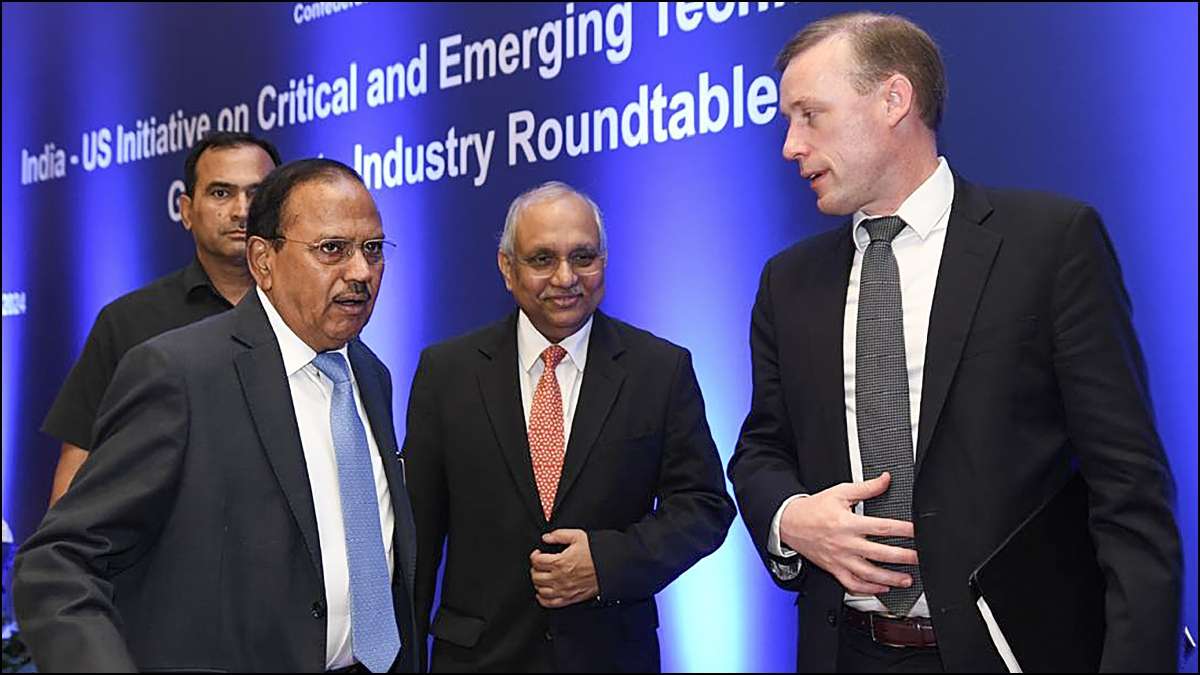
New Delhi: At a crucial meeting with his American counterpart Jake Sullivan, National Security Advisor Ajit Doval on Tuesday asserted that India and the US must remain at the forefront of developing critical technologies as part of a larger strategic interest. His remarks came after Sullivan visited India to review the implementation of the ambitious initiative on critical and emerging technologies (iCET) and briefed Prime Minister Narendra Modi and External Affairs Minister S Jaishankar on the same.
Doval and Sullivan convened an industry roundtable in New Delhi on iCET through the Confederation of Indian Industry (CII), which brought together industry leaders from both countries, as India and the US seek to mobilise private sector investment and partnerships across strategic technology sectors. The two unveiled a slew of initiatives to deepen India-US cooperation in artificial intelligence, semiconductors, critical minerals, advanced telecommunication and defence space.
As per reports, the two top security officials also discussed the proposed India-Middle East-Europe Economic Corridor (IMEC), which faces delays due to the ongoing situation in West Asia. Sullivan’s trip to India occurred three days subsequent to Prime Minister Narendra Modi and US President Joe Biden exchanging brief words during the G7 summit in Italy’s Apulia region.
“The US and India have got to remain at the forefront of technology in case we need to protect and defend our value systems and it is part of a larger strategic interest,” Doval said, highlighting the role of industries in technology and the progress of the ambitious iCET project.
‘iCET has achieved more than we could imagine’
Speaking at the roundtable meet, Sullivan underscored the importance of three buckets for technology partnerships – innovation, production and deployment. He also highlighted the importance of innovation and emphasised the need for government support for the private sector.
The top Biden administration official further said the core of iCET is about the idea of India and the US being able to support each other and to encourage greater collaboration in the technology ecosystem, jointly innovate and find solutions to challenges. Doval also stressed that the iCET “achieved more than we could imagine”.
Both the NSAs assured the industry that they welcome the industry highlighting specific issues and due diligence will be done to resolve any barriers which hold back deeper and closer India-US ties. Indian industry leaders comprising representatives from 3rdiTech, BHEL, Bharat Forge, Bharti Airtel, Bhukhanvala Industries, Centum Electronics, L&T, Tata Advanced Systems, Tata Power and Tejas Network were present at the meet.
Sullivan’s visit to India
The two NSAs earlier met in Delhi on Monday to took stock of the “significant strides” made by India and the US toward deepening and expanding strategic cooperation across key technology sectors including space, semiconductors, advanced telecommunications, artificial intelligence, quantum, biotechnology, critical minerals and clean energy, said the Ministry of External Affairs.
The top Biden administration official also met External Affairs Minister S Jaishankar on Monday. “Delighted to welcome US NSA @JakeSullivan46 in New Delhi today morning. A comprehensive discussion on a broad range of bilateral, regional and global issues,” Jaishankar said on ‘X’. “Confident that India-US strategic partnership will continue to advance strongly in our new term,” he said.
Later in the evening, Sullivan met Prime Minister Modi, where the latter affirmed India is committed to further strengthening its comprehensive global strategic partnership with the US for global good. The Prime Minister’s Office (PMO) said Sullivan briefed PM Modi on the progress in various areas of bilateral cooperation, particularly under the iCET such as semiconductors, artificial intelligence, telecom, defence, critical minerals, and space, among others.
What is the iCET project?
Notably, the iCET was launched by PM Modi and President Biden on the sidelines of the Quad summit in Tokyo on May 24, 2022. Subsequently, Doval and Sullivan have made concerted efforts to implement the roadmap under the iCET framework with a focus on cooperation in new and emerging technologies, including semiconductors, artificial intelligence, quantum computing, defence innovation, space and advanced telecommunications.
The two sides have included new areas under iCET that included biotechnology, critical minerals and rare earths processing technologies, digital connectivity, digital public infrastructure and advanced materials. The ongoing visit gives the NSAs an opportunity to review the progress and set new priorities and deliverables for iCET, people familiar with Doval-Sullivan talks said. The two NSAs also discussed bilateral issues and reviewed the India-US partnership on regional and global issues of mutual interest.
(with inputs from agency)
ALSO READ | PM Modi meets US Security Advisor Jake Sullivan in Delhi, says ‘India is committed to…’